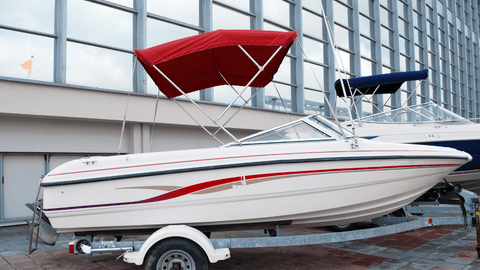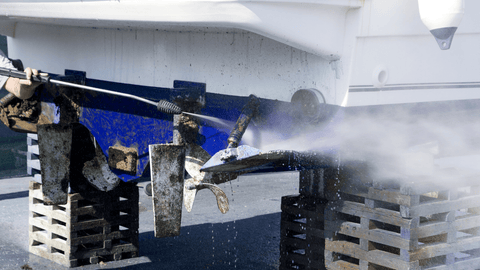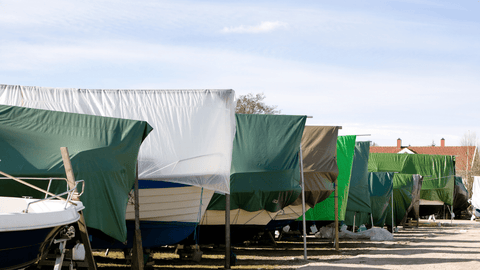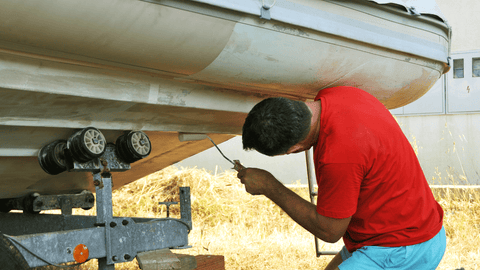How to Winterize Your Boat & Boat Trailer
Winterizing your boat and boat trailer is an essential step to protect your valuable investment from the harsh winter weather. By properly preparing and storing your boat and trailer, you can ensure they are in prime condition when the boating season returns. In this article, we will guide you through the process of winterizing your boat and trailer, highlighting the importance of each step.
Also Read:
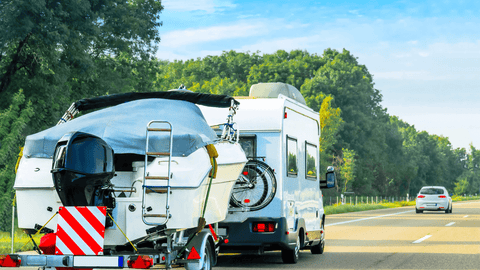
Understanding the Importance of Winterizing Your Boat
Before we delve into the specifics of winterizing your boat and trailer, it's crucial to understand why this process is so important. Failing to winterize your boat can lead to significant damage and costly repairs. Here are a few risks of not winterizing your boat:
The Risks of Not Winterizing Your Boat
- Freezing temperatures can cause water inside your boat's systems to expand, leading to cracked pipes, hoses, and fittings.
- Moisture trapped inside the boat can promote the growth of mold and mildew, leading to unpleasant odors and damage to interior surfaces.
- Cold weather can cause engine parts to freeze and corrode, resulting in serious engine damage that may require costly repairs or replacements.
Benefits of Proper Winterization
Now that you understand the risks, let's explore the benefits of properly winterizing your boat and trailer:
- Protects your investment: Winterizing your boat and trailer ensures they remain in optimal condition, preserving their value for future use or potential resale.
- Prevents damage: By taking the necessary steps to drain and protect your boat's systems, you can minimize the risk of costly repairs caused by freezing temperatures or corrosion.
- Peace of mind: Knowing that your boat and trailer are safely stored and protected during the winter months allows you to focus on other activities without worrying about potential damage.
When it comes to winterizing your boat, there are several key steps to consider. One important aspect is preparing the engine. This involves draining the cooling system and adding antifreeze to prevent any remaining water from freezing and causing damage. Additionally, it's crucial to change the oil and filter to ensure that the engine is protected during the winter months.
Another important aspect of winterizing your boat is protecting the interior. Moisture can be a major issue during the winter, so it's essential to remove any excess water from the bilge and other compartments. This can be done by using a bilge pump or manually sponging out the water. Once the water is removed, it's a good idea to use a moisture absorber or dehumidifier to keep the interior dry and prevent the growth of mold and mildew.
Furthermore, it's important to consider the exterior of your boat. Giving it a thorough cleaning and applying a protective wax coating can help to prevent damage from the harsh winter elements. Additionally, covering your boat with a high-quality boat cover will provide an extra layer of protection against snow, ice, and debris.
When it comes to the trailer, proper winterization is just as important. This includes checking the tires for proper inflation and adding a protective coating to prevent rust and corrosion. It's also a good idea to lubricate the trailer's moving parts, such as the hitch and wheel bearings, to ensure smooth operation when it's time to use the trailer again.
By taking the time to properly winterize your boat and trailer, you can enjoy the peace of mind knowing that they are protected from the potential damage that winter can bring. Not only will this help to preserve the value of your investment, but it will also ensure that you can get back on the water quickly and easily when the warmer months return.
Preparing Your Boat for Winterization
Before you begin the actual winterization process, it's essential to prepare your boat. Follow these steps to ensure everything is in order:
Cleaning and Inspection
Start by thoroughly cleaning your boat, both inside and out. Remove any debris, dirt, or salt residue that may have accumulated during the boating season. Not only will this make your boat look better, but it will also help prevent corrosion and damage to the various components.
When cleaning the exterior, pay special attention to the hull. Inspect it for any signs of damage, such as cracks or blistering. Address any necessary repairs before winter sets in to avoid further deterioration. Additionally, check the propeller and other underwater parts for any signs of wear or damage.
After cleaning the exterior, move on to the interior of your boat. Give the upholstery a thorough cleaning, removing any stains or dirt. Vacuum the carpets and clean the storage compartments, ensuring they are free from any debris or moisture. It's also a good idea to remove any food and personal items from the boat to prevent mold growth or attracting pests during the winter months.
Draining and Flushing Systems
Once your boat is clean, it's time to drain and flush the various systems to prevent any water from freezing and causing damage. Start with the freshwater system, including tanks, hoses, and faucets. Use an air compressor or pump to blow out any remaining water, ensuring that there is no water left that could freeze and expand, potentially causing burst pipes or fittings.
Move on to the bilge system and ensure it is completely drained. Stagnant water in the bilge can lead to foul odors, corrosion, and even freezing, which can damage the pump or other components. Use a bilge pump or manually remove any water present, and then thoroughly dry the bilge area.
Additionally, it's important to drain the fuel system following the manufacturer's instructions. This will help prevent fuel deterioration or blockages that could affect the performance of your boat when you're ready to use it again in the spring. Properly disposing of any drained fuel is also crucial for environmental safety.
Don't forget to drain and flush other systems, such as the cooling system, sanitation system, and any other water-related components. Each system may have specific steps to follow, so consult your boat's manual or seek professional advice if you're unsure.
By taking the time to thoroughly clean and inspect your boat, as well as properly drain and flush the various systems, you'll be well on your way to winterizing your boat and ensuring it's in top condition for the next boating season.
Step-by-Step Guide to Winterizing Your Boat
Now that your boat is prepared, it's time to start the winterization process. In this section, we will provide a step-by-step guide to winterize the essential systems of your boat.
Engine and Fuel System Winterization
Properly winterizing the engine and fuel system is crucial to prevent damage caused by freezing temperatures. Follow these steps:
- Change the engine oil and replace the oil filter.
- Flush the engine with a specialized engine antifreeze solution.
- Stabilize the fuel by adding a fuel stabilizer according to the manufacturer's instructions.
- Run the engine for a few minutes to ensure the stabilization is distributed throughout the fuel system.
Winterizing the engine and fuel system is not only about protecting them from freezing temperatures, but also about ensuring their longevity and performance. By changing the engine oil and replacing the oil filter, you remove any contaminants that may have accumulated during the boating season. Flushing the engine with a specialized antifreeze solution helps to remove any remaining water and prevent corrosion. Stabilizing the fuel is essential to prevent the formation of varnish and gum, which can clog the fuel system and cause starting problems in the future. Running the engine after adding the stabilizer ensures that it is evenly distributed throughout the fuel system, providing maximum protection.
Water System and Plumbing Winterization
To winterize the water system and plumbing on your boat, follow these steps:
- Drain all water from the freshwater tanks, hot water heater, and water lines.
- Use a specialized non-toxic antifreeze designed for boat plumbing systems to fill the water lines.
- Open all faucets and run the antifreeze until it flows out.
- Flush the toilet and pumps with an antifreeze solution.
Winterizing the water system and plumbing is crucial to prevent damage caused by freezing temperatures. Draining all water from the freshwater tanks, hot water heater, and water lines ensures that there is no water left to freeze and expand, potentially causing cracks or burst pipes. Filling the water lines with a specialized non-toxic antifreeze designed for boat plumbing systems provides an added layer of protection. Opening all faucets and running the antifreeze until it flows out ensures that all water has been replaced with antifreeze. Flushing the toilet and pumps with antifreeze solution prevents any remaining water from freezing and damaging these components.
Electrical System Winterization
Protecting the electrical system is essential to prevent damage and ensure it functions correctly when the boating season returns. Follow these steps:
- Disconnect the battery and clean the terminals.
- Store the battery in a cool and dry place to prevent self-discharge.
- Inspect all wiring for any signs of damage or wear.
- Remove any electronic devices or accessories from your boat and store them in a safe place.
Winterizing the electrical system is crucial to prevent corrosion, electrical malfunctions, and battery discharge. Disconnecting the battery and cleaning the terminals helps to prevent any residual electrical activity that can drain the battery over time. Storing the battery in a cool and dry place prevents self-discharge and extends its lifespan. Inspecting all wiring for any signs of damage or wear ensures that any issues are addressed before they become major problems. Removing electronic devices or accessories from your boat and storing them in a safe place protects them from the harsh winter conditions and potential theft.
Winterizing Your Boat Trailer
While winterizing your boat is essential, it's equally important to take care of your boat trailer. Follow these steps to ensure your trailer remains in optimal condition:
Checking and Maintaining the Trailer Tires
Inspect the trailer tires, checking their tread depth and air pressure. It's crucial to have good traction on the road, especially during winter when the roads can be slippery. Replace any tires that show signs of wear or are nearing their expiration date. This will help prevent blowouts and ensure a smooth and safe journey. Additionally, ensure the wheel bearings are adequately lubricated and adjusted. Properly lubricated wheel bearings will reduce friction and heat, extending the life of your trailer tires.
Don't forget to also inspect the spare tire. Even though it may not be used often, it's essential to have a reliable spare tire in case of emergencies. Make sure it's properly inflated and in good condition.
Protecting the Trailer Frame
Thoroughly clean the trailer frame and apply a layer of rust-inhibiting spray or wax to protect it from corrosion. During winter, road salt and moisture can cause significant damage to the trailer frame. By applying a protective coating, you can prevent rust and keep your trailer looking its best for years to come. Also, inspect the trailer hitch, coupler, and safety chains for any signs of damage and address any necessary repairs. A strong and secure hitch is crucial for safe towing, so it's essential to fix any issues before hitting the road.
Trailer Lighting and Electrical System
Check all trailer lights to ensure they are functioning correctly. Properly working lights are not only essential for your safety but also for the safety of other drivers on the road. Clean the light fixtures and replace any bulbs that have burned out. A well-lit trailer will make it easier for others to see you, especially during low visibility conditions. Inspect the electrical connections and replace any damaged or frayed wires to prevent electrical failures during transportation. Faulty wiring can lead to malfunctioning lights or even complete electrical system failure, so it's crucial to address any issues promptly.
Additionally, consider investing in LED lights for your trailer. LED lights are more energy-efficient and have a longer lifespan compared to traditional incandescent bulbs. They also provide brighter illumination, making your trailer more visible to others on the road.
Remember, proper maintenance and care for your boat trailer will not only ensure its longevity but also contribute to a safer and more enjoyable towing experience. By following these steps, you can confidently hit the road, knowing that your trailer is in optimal condition.
Checking Your Bunk Boards and Bunk Carpet
In addition to the above steps, it's imperative to pay attention to your bunk boards and bunk carpet. These components play a pivotal role in supporting and protecting your boat during transportation. Start by visually inspecting the bunk boards for any signs of wear, such as cracking, splitting, or rot. Check for loose or missing fasteners, such as screws or bolts, and address any damage you find promptly. Proper alignment of the bunk boards is crucial to provide even support for your boat's hull, ensuring an even distribution of pressure and preventing potential damage or warping.
The condition of the bunk carpet is also of utmost importance. Over time, the carpet can wear down, tear, or accumulate debris that may scratch your boat's hull. Replace any carpet with tears or worn areas to prevent damage to your boat. Ensure the carpet is clean, free from debris, and properly secured for a secure grip during loading and unloading. Regular maintenance and timely replacements of bunk boards and bunk carpet contribute to a safer and more enjoyable towing experience, ensuring your boat remains in top condition throughout the winter and beyond.
Storing Your Boat and Trailer for Winter
Choosing the right storage location is crucial to protect your boat and trailer from the elements.
Follow these tips:
When it comes to storing your beloved boat and trailer during the winter months, it's important to consider all the factors that could potentially harm them. Snow, rain, and extreme temperatures can wreak havoc on your watercraft, causing damage that could be costly to repair. To ensure the safety and longevity of your boat and trailer, it's essential to choose the right storage location.
Choosing the Right Storage Location
One of the best options for winter boat storage is a covered storage facility. This provides maximum protection from the harsh elements that winter brings. By keeping your boat and trailer indoors, you can shield them from snow, rain, and extreme temperatures. Indoor storage not only protects your watercraft from the weather but also prevents potential theft or vandalism.
However, if indoor storage is not an option for you, there are still steps you can take to protect your boat and trailer. Investing in a sturdy, waterproof boat cover is essential. Make sure the cover adequately fits your boat and trailer, leaving no room for water or snow to seep in. A snug fit will ensure that your watercraft remains dry and protected.
Covering and Protecting Your Boat and Trailer
Before covering your boat, it's crucial to give it a thorough cleaning. Remove any dirt, grime, or debris that may have accumulated during your last outing. Cleaning your boat not only helps to maintain its appearance but also prevents any potential damage that could be caused by debris left on the surface.
Once your boat is clean and dry, it's time to invest in a high-quality boat cover. Look for a cover that is breathable, allowing air to circulate and prevent moisture buildup. Moisture can lead to mold, mildew, and other issues that can damage your boat's interior and exterior. A breathable cover will also prevent condensation from forming, which can be detrimental to your boat's electronics and upholstery.
When securing the boat cover, consider using padding or supports to prevent it from sagging. This will help to prevent water pooling and ensure that the cover remains taut and effective. Additionally, make sure to check on your boat periodically during the winter months to ensure that the cover is still in place and functioning properly.
By following these tips and taking the necessary precautions, you can rest easy knowing that your boat and trailer are well-protected during the winter months. Proper storage and maintenance will not only extend the lifespan of your watercraft but also ensure that it's ready to hit the water when the warmer seasons arrive.
De-Winterizing Your Boat and Trailer
Once winter comes to an end, it's time to de-winterize your boat and trailer to prepare them for the upcoming boating season. Follow these steps:
Preparing for the Boating Season
Inspect your boat and trailer for any signs of damage or wear that may have occurred during the winter months. Address any necessary repairs or maintenance tasks before getting back on the water. Reconnect the battery and ensure it is fully charged.
Inspecting and Testing Systems Post-Winter
Test all the boat's systems, including the engine, electronics, and plumbing, to ensure they are functioning correctly. It's also essential to check the trailer lights, tire pressure, and wheel bearings before hitting the road. If any issues arise, address them promptly to avoid potential problems during your next boating adventure.
By following these steps and properly winterizing your boat and trailer, you can ensure they remain in excellent condition during the off-season. Not only will this protect your investment, but it will also give you peace of mind, knowing that your boat will be ready for another season of adventures on the water. So, don't overlook the importance of winterization and start preparing your boat and trailer today!


